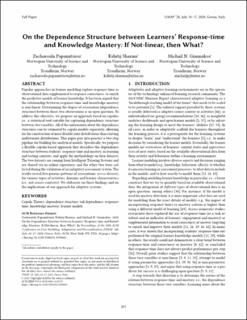| dc.description.abstract | Popular approaches in learner modeling explore response-time as observational data supplemental to response correctness, to enrich the predictive models of learner knowledge. It has been argued that the relationship between response-time and knowledge mastery is non-linear. Determining the degree of association (dependence structure) between those two observations is an open question. To address this objective, we propose an approach based on copulas, i.e., a statistical tool suitable for capturing dependence structure between two variables. All of the information about the dependence structures can be estimated by copula models separately, allowing for the construction of more flexible joint distributions than existing multivariate distributions. This paper puts into practice a two-step pipeline for building the analytical models. Specifically, we propose a flexible copula-based approach that describes the dependence structure between students' response-time and mastery, in learning and testing contexts, and apply the methodology on four datasets. The two datasets are coming from Intelligent Tutoring Systems and are shared via an online repository, and the other two were collected during the validation of an (adaptive) assessment system. The results reveal five generic patterns of associations across-datasets, for various types of activities, domains and learner characteristics (i.e., not across-contexts). We elaborate on those findings and on the implications of our approach for adaptive systems. | en_US |
